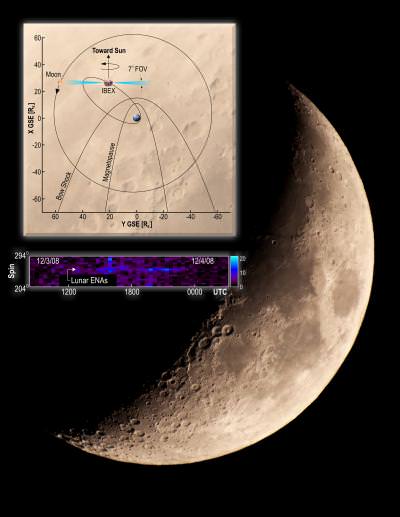[/caption]
NASA’s Interstellar Boundary Explorer (IBEX) spacecraft has made the first observations of fast hydrogen atoms coming from the moon, following decades of speculation and searching for their existence. Launched last October, the IBEX has a mission to image and map the dynamic interactions caused by the hot solar wind slamming into the cold expanse of space. But as the IBEX team commissioned the spacecraft, they discovered the stream of neutral hydrogen atoms which are caused by the solar wind scattering off the moon’s surface.
The detector which made the discovery, called IBEX-Hi, was designed and built by the Southwest Research Institute and Los Alamos National Labs to measure particles moving at speeds of 0.5 million to 2.5 million miles an hour.
“Just after we got IBEX-Hi turned on, the moon happened to pass right through its field of view, and there they were,” says Dr. David J. McComas, IBEX principal investigator and assistant vice president of the SwRI Space Science and Engineering Division, where the IBEX-Hi particle detector was primarily built. “The instrument lit up with a clear signal of the neutral atoms being detected as they backscattered from the moon.”
The solar wind, the supersonic stream of charged particles that flows out from the sun, moves out into space in every direction at speeds of about a million mph. The Earth’s strong magnetic field shields our planet from the solar wind. The moon, with its relatively weak magnetic field, has no such protection, causing the solar wind to slam onto the moon’s sunward side.
From its vantage point in high earth orbit, IBEX sees about half of the moon — one quarter of it is dark and faces the nightside (away from the sun), while the other quarter faces the dayside (toward the sun). Solar wind particles impact only the dayside, where most of them are embedded in the lunar surface, while some scatter off in different directions. The scattered ones mostly become neutral atoms in this reflection process by picking up electrons from the lunar surface.
The IBEX team estimates that only about 10 percent of the solar wind ions reflect off the sunward side of the moon as neutral atoms, while the remaining 90 percent are embedded in the lunar surface. Characteristics of the lunar surface, such as dust, craters and rocks, play a role in determining the percentage of particles that become embedded and the percentage of neutral particles, as well as their direction of travel, that scatter.
McComas says the results also shed light on the “recycling” process undertaken by particles throughout the solar system and beyond. The solar wind and other charged particles impact dust and larger objects as they travel through space, where they backscatter and are reprocessed as neutral atoms. These atoms can travel long distances before they are stripped of their electrons and become ions and the complicated process begins again.
The combined scattering and neutralization processes now observed at the moon have implications for interactions with objects across the solar system, such as asteroids, Kuiper Belt objects and other moons. The plasma-surface interactions occurring within protostellar nebula, the region of space that forms around planets and stars — as well as exoplanets, planets around other stars — also can be inferred.
IBEX’s primary mission is to observe and map the complex interactions occurring at the edge of the solar system, where the million miles per hour solar wind runs into the interstellar material from the rest of the galaxy. The spacecraft carries the most sensitive neutral atom detectors ever flown in space, enabling researchers to not only measure particle energy, but also to make precise images of where they are coming from.
And the spacecraft is just getting started. Towards the end of the summer, the team will release the spacecraft’s first all-sky map showing the energetic processes occurring at the edge of the solar system. The team will not comment until the image is complete, but McComas hints, “It doesn’t look like any of the models.”
The research was published recently in the journal Geophysical Research Letters.
Source: Southwest Research Institute


“It doesn’t look like any of the models.”
Awesome! Pure awesome. This thing is paying off in spades already – I’ve been looking forward to the results of this mission for quite a while now. Looks like they won’t disappoint…
Ah, what would sputter processes be without those pesky scattered neutrals?
I’m more amazed that so much of the light hydrogen actually embeds. But hydrogen is really good at material penetration, so presumably such a naive model would suffice as a start.
Wordy but explanatory press release, makes you wonder about how a correct model over this planetary hydrogen pool table would look like.
Ditto Astrofiend’s and T Larsson OM’s comments completely! These are entirely relevant questions in regards to quantitative measurements of these quantitative observations. No conspiracy theory needed here.The entire world wants to know, on an iPod, if possible! 🙂